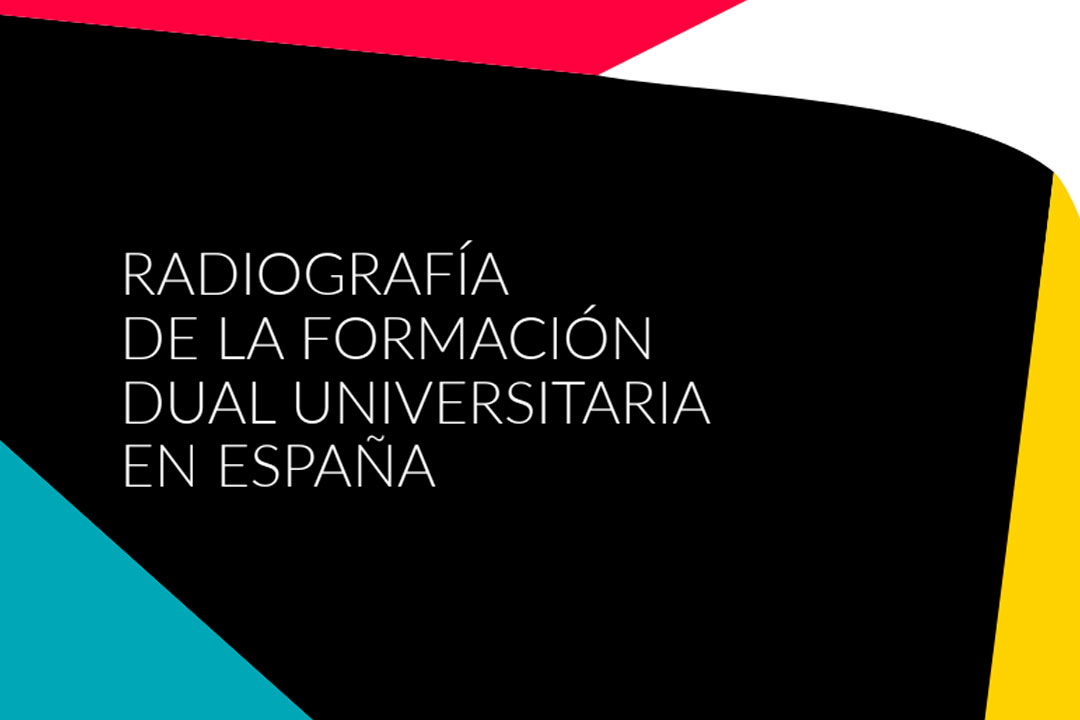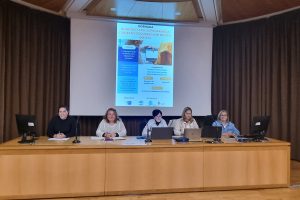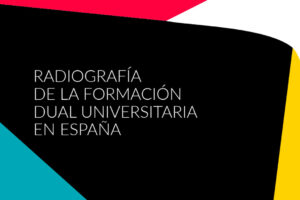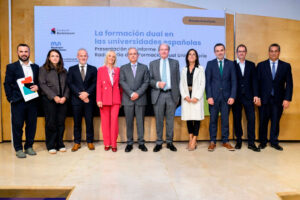The University Dual Education (FDU) is experiencing a significant rise in Spain. After more than a decade of development in Vocational Education, dual education is beginning to make its way into universities. This is evident from the first study analyzing the situation of this model in the country, which highlights the fact that one in three Spanish universities (37%) already offers some dual degree, while nearly half (48%) plans to implement it. The analysis, titled ‘Radiography of University Dual Education in Spain’, was promoted by the Bertelsmann Foundation along with the Conference of Social Councils of Spanish Universities and the University of Mondragón and was presented on October 14th in Madrid.
Unlike curricular internships, in FDU the company or collaborating entity participates, along with the university, in the development of part of the curriculum. Compensation is mandatory, and the time students spend in the company/entity is longer than in internships. Thus, the direct connection between students and the business world helps them to be better prepared to face the challenges of social, technological, and economic transformations in the labor market.
“Until recently, university dual education was a feature of the Basque university system,” says Jon Altuna, academic vice-rector of Mondragon Unibertsitatea, “and it was also occasionally present in some universities, such as the University of Lleida or the University of Almería. However, we are seeing that interest in this educational modality has recently expanded to Spanish universities as a whole. Given the prospects of higher employability and greater student satisfaction, Spanish universities are beginning to show great interest in including dual education in their academic offerings.”




The rise of university dual education in Spain
Of the 17 Autonomous Communities, 11 currently offer dual university studies. Basque Country is, by far, the region with the highest number of such degrees (30 bachelor’s degrees and 17 master’s degrees), primarily due to the commitment of Mondragon Unibertstiatea, which stands out as the university with the highest number of dual degrees and a student employment rate of 91%. Universities in Andalusia are also showing interest in dual education, with more than half of the universities already offering dual degrees. Among them, the University of Almería (UAL) stands out, having integrated dual education into almost all its bachelor’s degrees and some of its master’s degrees (19 bachelor’s degrees and 12 master’s degrees) for the past decade. Growth is also notable in Catalonia, where the University of Lleida (UdL) has been a pioneer in the deployment of FDU (3 bachelor’s degrees and 2 master’s degrees). In general, 72 bachelor’s degrees and 51 master’s degrees have been dualized in Spain.
In the opinion of Vicent Climent-Ferrando, project manager at the Bertelsmann Foundation and study coordinator, the rise of FDU in Spain is due to several factors. “The first is the need for greater dialogue between universities and companies. However, there is a second, much more strategic factor that responds to the current, highly complex, and changing reality, which requires thinking about new professions, knowledge, and technologies. Universities are increasingly aware that they must be agile and incorporate more dynamic training programs that adapt to the current context, which is why they have started to integrate dual education as a training modality that can address these changes.”
For Antonio Abril, president of the Conference of Social Councils of Spanish Universities, “the growing demand for degrees adapted to the labor market and the high youth unemployment rate in Spain require the implementation of dual degrees at all educational levels. The dualization of degrees, from Vocational Education to bachelor’s and master’s degrees, can positively transform the employability and competitiveness of the country. For its implementation, it would be necessary to ensure that universities have both administrative and academic support structures to successfully manage dual programs.”
Engineering leads the way in dual education
The report also reveals that there are varying degrees of implementation depending on the field of study. The field of engineering stands out as it currently accounts for 64% of dual studies. A trend is observed in the area of industrial engineering, mechanical engineering, automation engineering, industrial organization engineering, and navigation engineering (27%), followed by computer and systems engineering (18%) or electrical, electronic, and telecommunications engineering (14%). In contrast, fields such as architecture, construction, building, urban planning, and civil engineering represent only 2% of dual studies.
On an international level, an increase in youth employment rates has been observed in countries where FDU is more widely implemented. In Germany, where dual education is a fundamental part of both vocational education and university systems, around 70% of students who complete a dual education program are directly hired by the company where they completed their training. These positive results are accompanied by a low youth unemployment rate (15 to 29 years old), which in 2023 was 5.5%. In Spain, that figure in 2023 was 26.8%, although information on the impact of FDU on youth employment is still in its early stages.
That said, the key point highlighted by the authors of the report is that greater coordination between universities, companies, and governments is needed, along with more flexible regulations and economic incentives, among other measures, to promote this educational model in Spain. More specifically, they point out the need to create a unified quality framework in Europe to ensure excellence, comparability, and international mobility in FDU.
After more than a decade of developing dual Vocational Education in Spain, the data leave no doubt about the direct link between dual education, higher employability, and greater student satisfaction. The depth and scope of the data suggest that, far from being a mere educational modality, dual education has set the course for irreversible change in Spanish universities.










